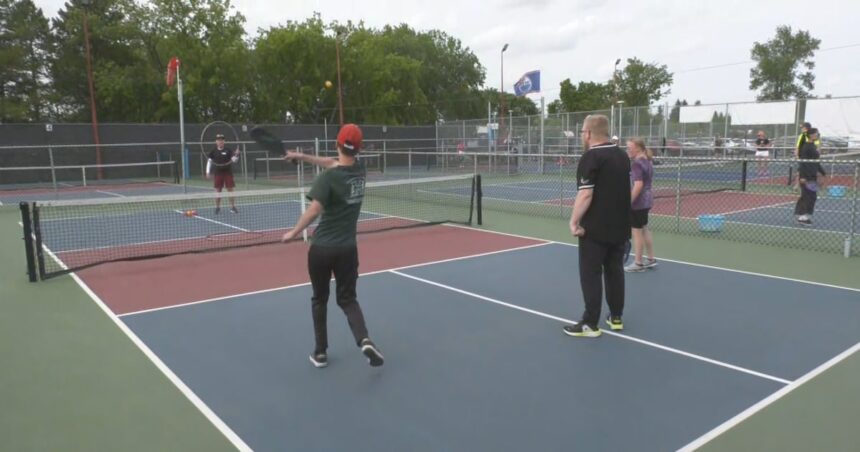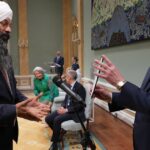The unmistakable pop-pop-pop sound echoes through the MacEwan University Sport and Wellness Centre as athletes focus intently on the small perforated plastic ball. I’ve spent the morning watching something truly special unfold on these courts – Edmonton’s Special Olympics athletes discovering the joy of pickleball.
“I never tried pickleball before,” says Michael, his face lighting up after successfully returning a serve. “Now I love it. I love the sport.”
Michael is one of fifteen Special Olympics athletes who gather weekly to learn and play this rapidly growing sport that combines elements of tennis, badminton, and ping-pong. The program, launched earlier this year, has quickly become a highlight for participants and coaches alike.
Coach Sarah Thompson tells me this initiative emerged from recognizing a gap in accessible sports opportunities. “We saw how pickleball was booming across Edmonton, with courts popping up everywhere. It seemed like the perfect inclusive activity to introduce to our athletes.”
And she’s right about the boom. According to the Edmonton Pickleball Club, membership has tripled since 2019, with waiting lists for court time at many community centers. The sport’s accessibility – requiring minimal equipment and being less physically demanding than tennis – makes it ideal for athletes of all abilities.
What strikes me most watching these sessions is the genuine joy and camaraderie. Between points, athletes high-five each other, regardless of who scored. Their enthusiasm is contagious.
“It’s about so much more than the sport itself,” explains volunteer coach David Chen. “We’re seeing improvements in hand-eye coordination, social skills, and confidence. Some athletes who were initially shy are now calling out strategies to their partners.”
The program runs year-round, providing continuity that’s vital for many Special Olympics participants. Indoor courts at MacEwan University during winter months transition to outdoor sessions at Kinsmen Park when weather permits.
The city’s support has been crucial. Edmonton Recreation has designated specific court times at several community centers exclusively for the Special Olympics program, addressing what can otherwise be a competitive scramble for court access in a sport experiencing explosive growth.
“I’ve made new friends,” shares Jasmine, 27, who joined the program three months ago. “My favorite part is playing doubles. We work as a team.”
For many participants, the predictable rules and clear boundaries of pickleball provide comfort alongside physical benefits. The sport’s smaller court size compared to tennis makes it more manageable, while the slower pace of play allows for greater success and participation.
Parents and caregivers notice the difference. “My son talks about pickleball all week,” says Maria Garcia, watching from the sidelines. “He’s sleeping better, has improved appetite, and generally seems happier on days he plays.”
The program has grown entirely through word of mouth. What started with six athletes now regularly attracts fifteen, with plans to expand to accommodate growing interest.
Funding remains the biggest challenge. Equipment costs, court rentals, and training for coaches all require ongoing support. Local business Specialty Sports has stepped up, donating paddles and balls, while the Edmonton Pickleball Club hosts occasional fundraisers.
“We never want cost to be a barrier,” emphasizes Thompson. “Every athlete who wants to play should have that opportunity.”
The benefits extend well beyond physical activity. Special Olympics Alberta reports that participants in sports programs show improved self-esteem, greater independence in daily activities, and broader social networks – all crucial factors in quality of life.
As my morning at the courts winds down, I notice coach Chen quietly working one-on-one with a new player struggling with serves. Their patience and determination reflect everything wonderful about this program – the focus on individual growth within a supportive community.
“See you next week!” several athletes call out as they leave, paddles tucked under arms, faces flushed from exertion and smiling widely.
In a city where winter months can be isolating, this indoor activity provides consistent exercise and social connection. The pickleball courts have become more than just a place to play – they’re a community where abilities are celebrated and new skills developed.
For more information on Edmonton’s Special Olympics programs or to volunteer, contact Special Olympics Alberta or visit the Edmonton Pickleball Club website, where regular inclusive events are posted.
The next time you hear that distinctive pop-pop-pop at your local recreation center, peek in – you might just witness the pure joy these athletes bring to Edmonton’s fastest-growing sport.







